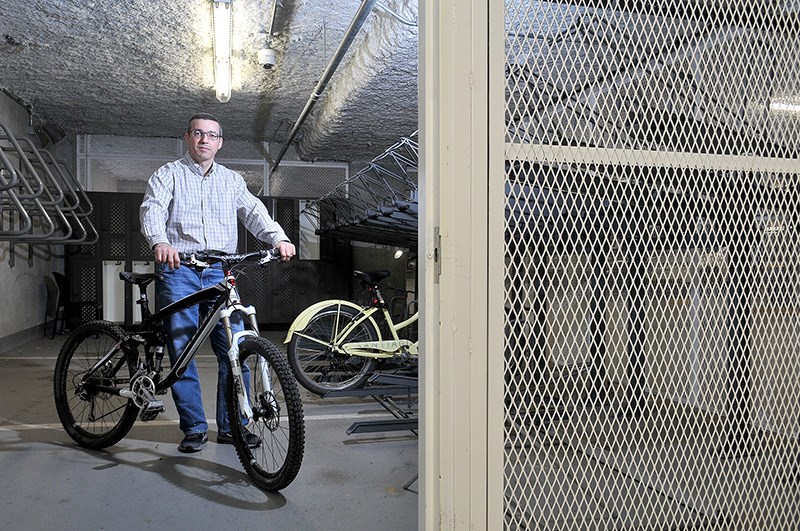Bike to Work Week, from May 28 to June 3, is meant to promote the benefits and ease of cycle commuting. But what to do with your bike once you get to your destination?
Navdeep Chhina, the communications director for HUB, a cycling advocacy group, admits a fear of bike theft is an obstacle that causes some commuters to leave their ride at home and use the car instead.
But as more people express an interest in using their bike to get to work, employers, communities and even TransLink are taking steps to ease those fears by providing more security for bikes and cyclists are being presented with more proactive options beyond just heavy U-locks to ensure their ride is still waiting for them at the end of the work day.
“It begins with infrastructure,” Chhina said. “If you have it, then people feel safe and they will bike.”
In 2014, Douglas College built secure bike enclosures in the underground parkades at its Coquitlam and New Westminster campuses. Students and employees can register free of charge to access the facilities, which feature racks for 50 bikes, small lockers to store gear, an air pump and even a work stand and tools to affect simple repairs or adjustments. Video surveillance adds an extra layer of security.
Debora Jackson, the manager of facilities services at the Coquitlam campus, said the lockup can be a busy place on a nice spring day, but it’s rarely filled to capacity. She said the school’s close proximity to transit and Coquitlam’s hilly terrain might work against bike commuting by staff and students.
For bike commuters looking to cover greater distances by incorporating transit into their ride, TransLink is increasing the number of bike parkades at its SkyTrain stations, including three scheduled to open in 2019 in the Tri-Cities, at Lafarge Lake-Douglas, Moody Centre and Burquitlam stations. Those are in addition to the three that already exist at Joyce-Collingwood, Main Street-Science World and King George stations with another three coming this year. Some stations also have bike lockers — small, secure cubbies that can be reserved by cyclists.
Chris Bryan, a senior media relations advisor for TransLink, said 1,207 people are registered to use the 120 spaces currently available in the parkades, each of which has a capacity of 40 bikes. He said July, August and September were the busiest months for their use last year.
“Bike parkades help make cycling an attractive option for more people,” Bryan said.
Cpl. MIchael McLaughlin of the Coquitlam RCMP said his department is always available to consult with employers about options for providing secure facilities for bike commuters.
“One of the first things you can do is go to the local community police stations and ask for help,” he said.
Police can then conduct a thorough environment assessment of the business to provide guidance about the best place to set up secure bike lock-ups.
“The more secure you can make bike storage, the better,” McLaughlin said.
But McLauglin cautioned that even an indoor bike parkade can provide a false sense of security as they can be breached by resourceful miscreants. So cyclists have to be proactive to protect their ride.
That can begin by taking a photo of the bike and recording its serial number so police can keep an eye out for it should it ever go missing.
Bike registry programs like Project 529 Garage also work with police departments to create a database of stolen and missing bikes.
McLaughlin said the local RCMP hasn’t aligned itself with that service because of the cost involved to the department and “bike theft isn’t significant enough of a problem in Coquitlam for us to make that initial investment.”
McLaughlin, an avid recreational cyclist himself, said the best security for any cyclist is to always keep their bike nearby.



